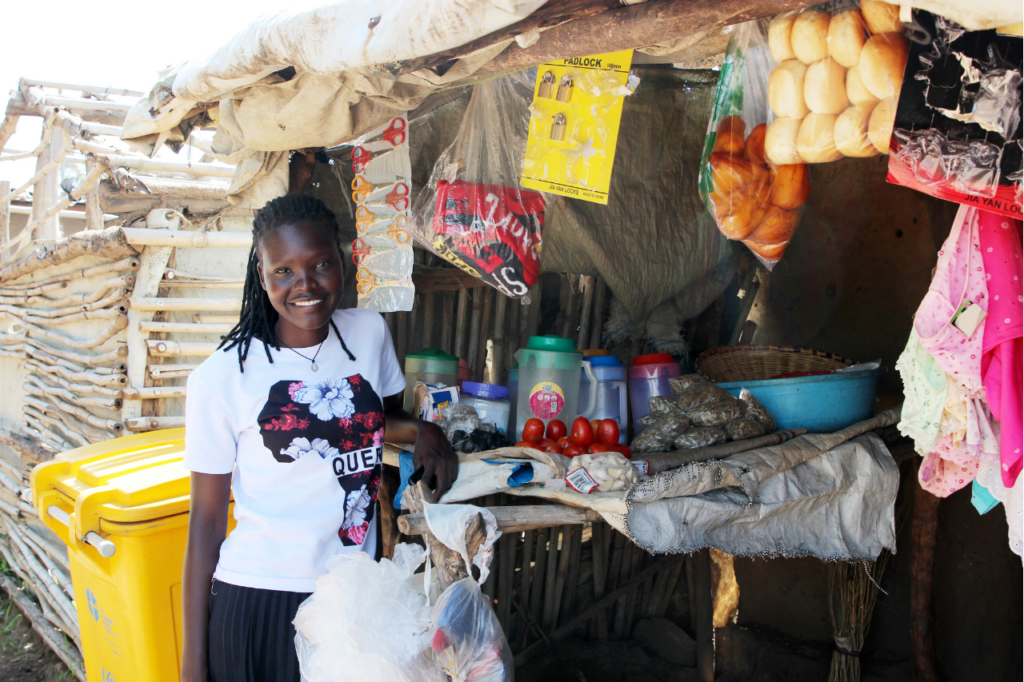Ruth didn’t want to drop out of school, but the 20-year-old refugee from South Sudan says she had no choice when she couldn’t afford the fees. “After I left school, I was at home, and life became very hard.”
The settlement where she lives, in the Adjumani district in the north of Uganda, is now home to some 15,000 people (including those who live in the host community). Uganda is the largest refugee host country in Africa. While it has a relatively progressive approach to refugee management, tensions exist among host communities, long-term refugees and new arrivals due to competition over decreasing resources and the actual or perceived belief of unequal access to services.
Ruth has eight siblings, three of whom are already married due to the family’s economic situation. She wanted to help her family, so she joined a business training program. Today, she is the proud owner of a successful small business, selling charcoal, dried fish, tomatoes, scissors, padlocks and dresses – a real corner store.

“I was able to borrow some money, and I started my business,” she explains. “When I started to make a profit, I repaid the money plus interest. I understand profit, loss and interest and other things that go into running a business.”
Her early success emboldened her to borrow more money to expand. “I thought to myself, ‘I am capable; I am strong,’” she says. Ruth has since repaid that loan, which makes her feel “happy and excited” that she can support her parents, buy food for the family and pay the school fees for her younger siblings. “I am now living happily. I’m shining and proud.”
Ruth credits her success to the mentors she met in the Youth Savings Group she joined. She hopes to also be a mentor one day. “I want others in my community to become empowered and move on with their lives,” she says. “My next step is to continue growing my business. I may get my mom to run this one while I start another. I also want to help my younger siblings finish school, and maybe I’ll return to school to study social work and social administration, because I like counselling people.”
In the past year, the Adolescent Girls in Crisis (AGiC) project has supported 3,344 people, including 1,235 girls and 866 young women, across two refugee settlements in northern Uganda. Participants in 25 Youth Savings Groups study business skills such as record keeping, branding, market assessment and business planning. They also learn about their social and economic rights, which decreases their risks of gender-based violence and early and forced marriage.
The results? To date, 157 adolescent girls and young mothers are now engaged in their businesses, and 81% of them say that the training has helped them manage their finances.
The project also created four Adolescent Girls and Young Mothers (AGYM) safe spaces, where participants can access protection services. To date, 109 survivors of violence have accessed non-food items and have been referred for further support.
In addition, 41 health workers have been trained in adolescent-friendly services. This has helped 3,936 adolescents access sexual and reproductive health services.
Women in Uganda own one in three businesses, yet they tend to run smaller businesses in less profitable areas than men.
Uganda is one of only seven countries worldwide that has achieved gender parity in terms of the number of women who become entrepreneurs.
30% of Ugandan women entrepreneurs started their businesses out of necessity, versus 21% of men.
Among entrepreneurs, women are less likely than men to have employees, but women are more likely than men to hire women as employees.
Women and children comprise 81% of Uganda’s 1.54 million refugees.
Ugandan refugee settlements are governed by Refugee Welfare Committees (RWCs). Committee members are elected every two years by the refugee community under the supervision of the Office of the Prime Minister. Up to 30% of RWC members can be refugees, but women are seldom represented.
UN Women provided training to address that, and women went from 10% representation in 2017 to 48% in Yumbe and 54% in Adjumani in 2022.
Worldwide, 108.4 million people were forcibly displaced at the end of 2022. That is more than one in every 74 people on earth.
At the end of June 2023, there were 1,561,634 refugees in Uganda. This makes Uganda the largest refugee-hosting country in Africa.
Over half (56.5%) of these refugees are from South Sudan. In the six months starting from January 2023, 18,522 people entered Uganda from South Sudan.
13.5% (210,741) are living in the Adjumani district. The host population of the district is 238,800, meaning that 47% of the district’s current population are refugees.
Many refugees live in settlements that differ from refugee camps in that they are integrated into host communities.